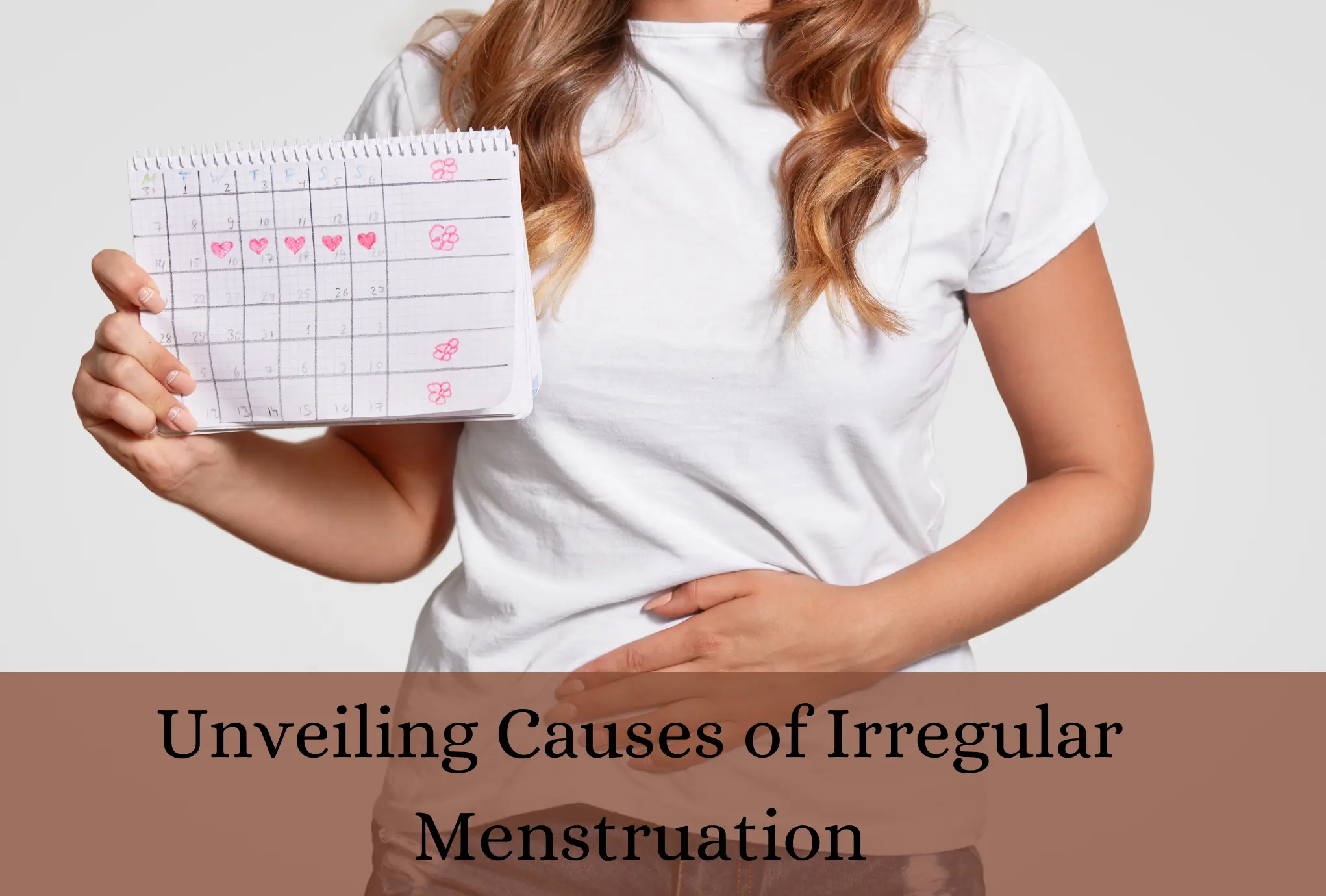Explore the reasons behind irregular periods in our latest blog. From hormonal shifts to lifestyle factors, we break down the common causes of irregular menstruation. Understanding your body’s signals is the first step to better menstrual health.
Let’s navigate the basics together and shed light on what might be influencing your menstrual cycle irregularities.
What is Irregular menstruation?
Irregular menstruation means periods that don’t follow a regular pattern. Instead of occurring at expected intervals, they may be early, late, or inconsistent. Factors like stress, hormonal changes, or health issues can cause irregularities. Monitoring your menstrual cycle helps identify patterns, ensuring overall reproductive health. Consult a healthcare professional if you have concerns about irregular menstruation.
Common Causes Of Irregular Menstruation
Explore the intricate factors behind irregular menstruation. Hormonal imbalances, lifestyle choices, and medical conditions play pivotal roles, influencing women’s reproductive health. Unravel the mysteries for informed well-being.
Hormonal Imbalances
One of the primary culprits behind irregular menstruation is hormonal imbalances. Fluctuations in estrogen and progesterone levels, crucial hormones for regulating the menstrual cycle, can lead to irregular periods. Conditions such as polycystic ovary syndrome (PCOS) and thyroid disorders often contribute to hormonal disruptions, affecting the frequency and regularity of menstrual cycles.
Stress and Lifestyle Factors
Modern lifestyles characterized by high stress levels, inadequate sleep, and poor nutrition can significantly impact menstrual regularity. Stress induces the release of cortisol, which can disrupt the delicate balance of reproductive hormones. Incorporating stress management techniques, prioritizing adequate sleep, and adopting a balanced diet can positively influence menstrual regularity.
Weight Fluctuations
Body weight plays a crucial role in hormonal balance and menstrual regularity. Significant weight fluctuations, whether due to rapid weight loss or gain, can disrupt hormonal levels and lead to irregular periods. Conditions like anorexia nervosa or obesity can particularly affect the frequency and regularity of menstrual cycles.
Medical Conditions
Certain medical conditions may contribute to irregular menstruation. Endometriosis, a condition where tissue similar to the uterine lining grows outside the uterus, can cause pain and irregular bleeding. Similarly, uterine fibroids, benign growths in the uterus, can impact menstrual patterns. Seeking medical attention for the diagnosis and management of these conditions is essential for restoring menstrual regularity.
Birth Control and Medications
The use of certain contraceptives or changes in contraceptive methods can affect menstrual cycles. Hormonal contraceptives, such as birth control pills or intrauterine devices (IUDs), can lead to changes in bleeding patterns. Additionally, the discontinuation of contraceptives may cause temporary irregularities as the body adjusts to the changes.
Perimenopause
As women approach menopause, typically in their 40s or 50s, menstrual irregularities become common. This transitional phase, known as perimenopause, is characterized by hormonal fluctuations leading to changes in the menstrual cycle. Irregular periods, skipped cycles, and changes in flow are typical during this natural aging process.
Underlying Reproductive Health Issues
Issues with the reproductive organs, such as polyps or abnormal growths in the uterus, can contribute to irregular menstruation. Infections or structural abnormalities may also impact the regular shedding of the uterine lining, resulting in irregular bleeding. Regular gynecological check-ups are crucial for identifying and addressing these issues.
When to Seek Medical Attention
While occasional irregularities are common, persistent or severe irregular menstruation warrants medical attention. Consult a healthcare professional if you experience:
- Unexplained changes in menstrual patterns.
- Excessive pain or discomfort during menstruation.
- Irregularities persisting for several months.
Conclusion
Empower your reproductive health by comprehending the causes of irregular menstruation. Whether it’s hormonal imbalances, lifestyle factors, or underlying medical conditions, addressing these concerns is essential for restoring menstrual regularity.
Schedule regular check-ups with Dr. Apurva Maurya Deshpande, a trusted Gynecologist at Deshpande Hospital in Baramati, for personalized care and guidance towards optimal reproductive well-being.

